Apple's Big AI Push Implied By Startup Acquisitions and Job Postings
Apple has been quietly making a series of artificial intelligence related acquisitions and staff hires in a bid to bring on-device AI to its next-generation iPhones, claims a new report by the Financial Times.

According to the report, indications suggest Apple has been focusing on "tackling the technological problem of running AI through mobile devices." To that end, it has acquired several AI-related startups, the last one occurring early last year when it purchased California-based WaveOne, which offers AI-powered video compression.
According to a recent research note from Morgan Stanley, almost half of Apple's AI job posts have included the term "Deep learning," which relates to the algorithms used to power generative AI.
Previous reports have suggested Apple has been testing its "Ajax" large language model (LLM) since early 2023, but in contrast to LLMs like OpenAI's ChatGPT, Apple's primary goal is to develop generative AI that works locally on-device, rather than being powered by cloud services in data centers.
The challenge in achieving that aim involves optimizing the LLM while reducing its size, as well as heavier reliance on high-performance mobile hardware and faster Apple silicon chips. For example, Apple is said to be planning a significant upgrade to the iPhone 16 microphone to improve a new AI-enhanced Siri experience.
Just last month, Apple AI researchers said they have made a key breakthrough in deploying large language models (LLMs) on iPhones and other Apple devices with limited memory by inventing an innovative flash memory utilization technique.
Apple is said to be on schedule to announce a series of generative AI-based tools at its Worldwide Developers Conference (WWDC) in June, when iOS 18 will be previewed. Morgan Stanley analysts expect the mobile software will be geared towards enabling generative AI and could include its voice assistant Siri being powered by an LLM.
Popular Stories
In addition to updating many of its existing products, Apple is expected to unveil five all-new products this year, including a smart home hub, a Face ID doorbell, a MacBook with an A18 Pro chip, a foldable iPhone, and augmented reality glasses.
Below, we have recapped rumored features for each product.
Smart Home Hub
Apple home hub (concept)
Apple's long-rumored smart home hub should...
Apple is planning to debut a high-end secondary version of AirPods Pro 3 this year, sitting in the lineup alongside the current model, reports suggest.
Back in September 2025, supply chain analyst Ming-Chi Kuo reported that Apple is planning to introduce a successor to the AirPods Pro 3 in 2026. This would be somewhat unusual since Apple normally waits around three years to make major...
Apple is working on a small, wearable AI pin equipped with multiple cameras, a speaker, and microphones, reports The Information. If it actually launches, the AI pin will likely run the new Siri chatbot that Apple plans to unveil in iOS 27.
The pin is said to be similar in size to an AirTag, with a thin, flat, circular disc shape. It has an aluminum and glass shell, and two cameras at the...
Over the last few months, rumors around the iPhone 18 Pro's front-panel design have been conflicted, with some supply-chain leaks pointing to under-display Face ID, reports suggesting a top-left hole-punch camera, and debate over whether the familiar Dynamic Island will shrink, shift, or disappear entirely.
Today, Weibo-based leaker Instant Digital shared new details that appear to clarify the ...
The Apple supplier subject to a major cyberattack last month was China's Luxshare, it has now emerged. More than 1TB of confidential Apple information was reportedly stolen.
It was reported in December that one of Apple's assemblers suffered a significant cyberattack that may have compromised sensitive production-line information and manufacturing data linked to Apple. The specific company...





















